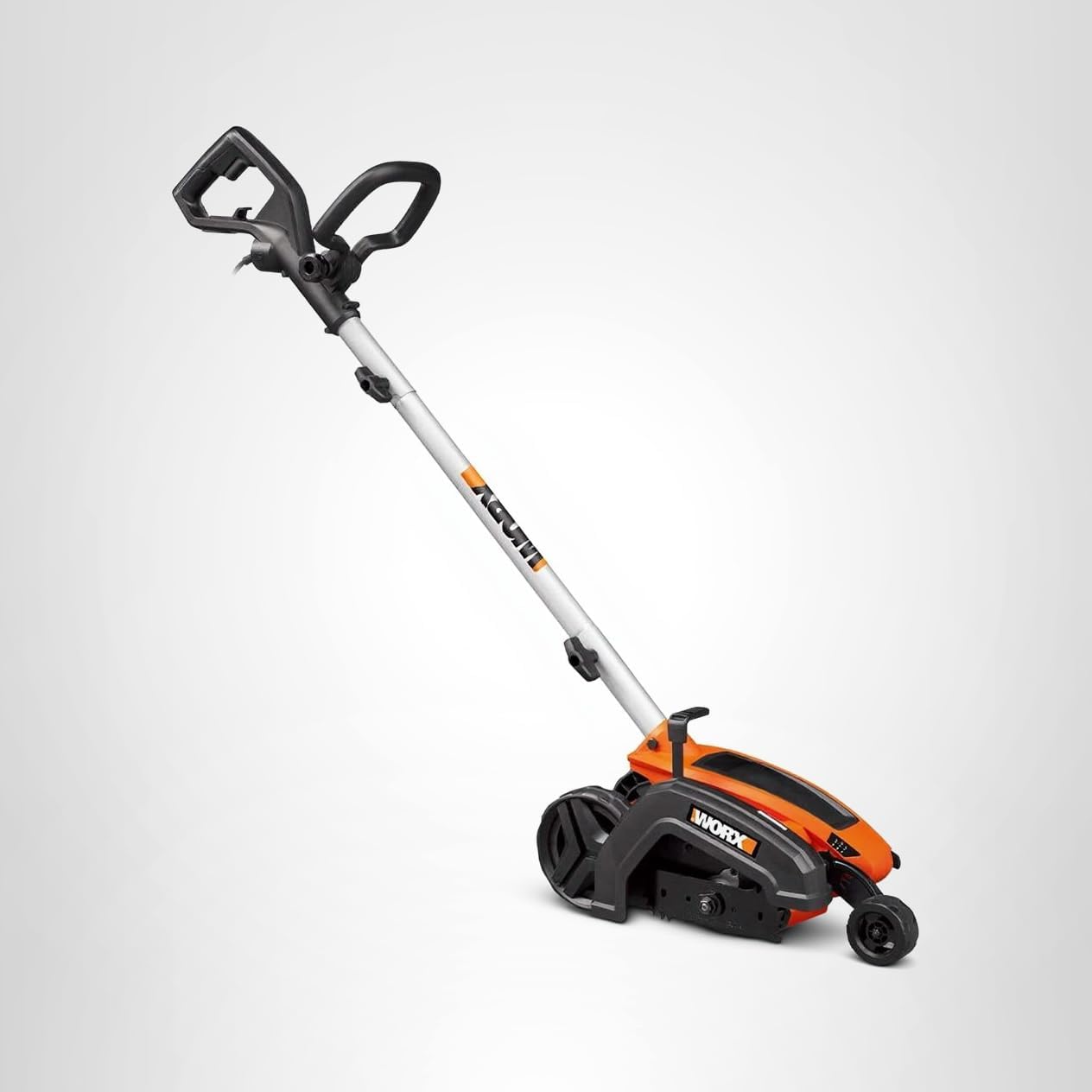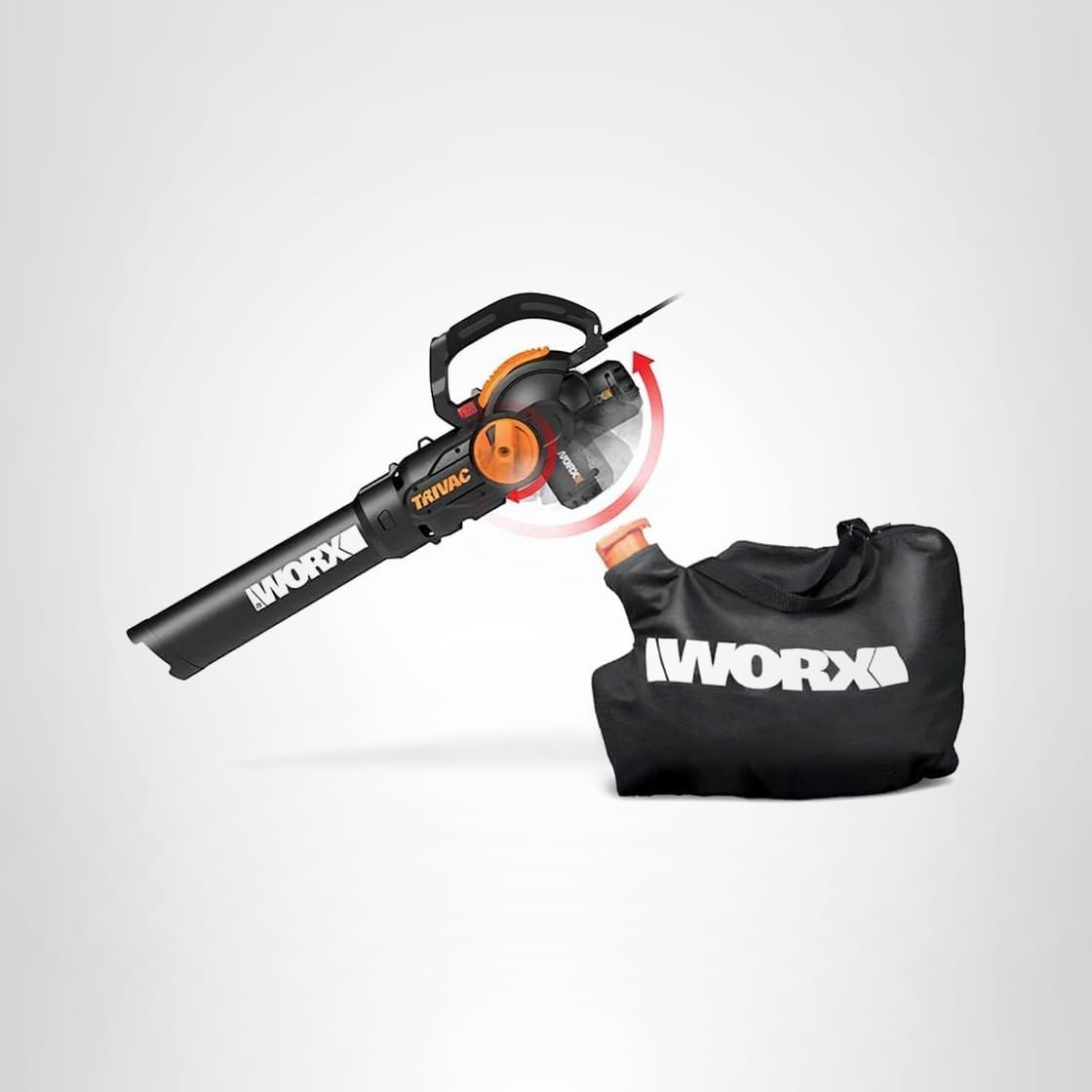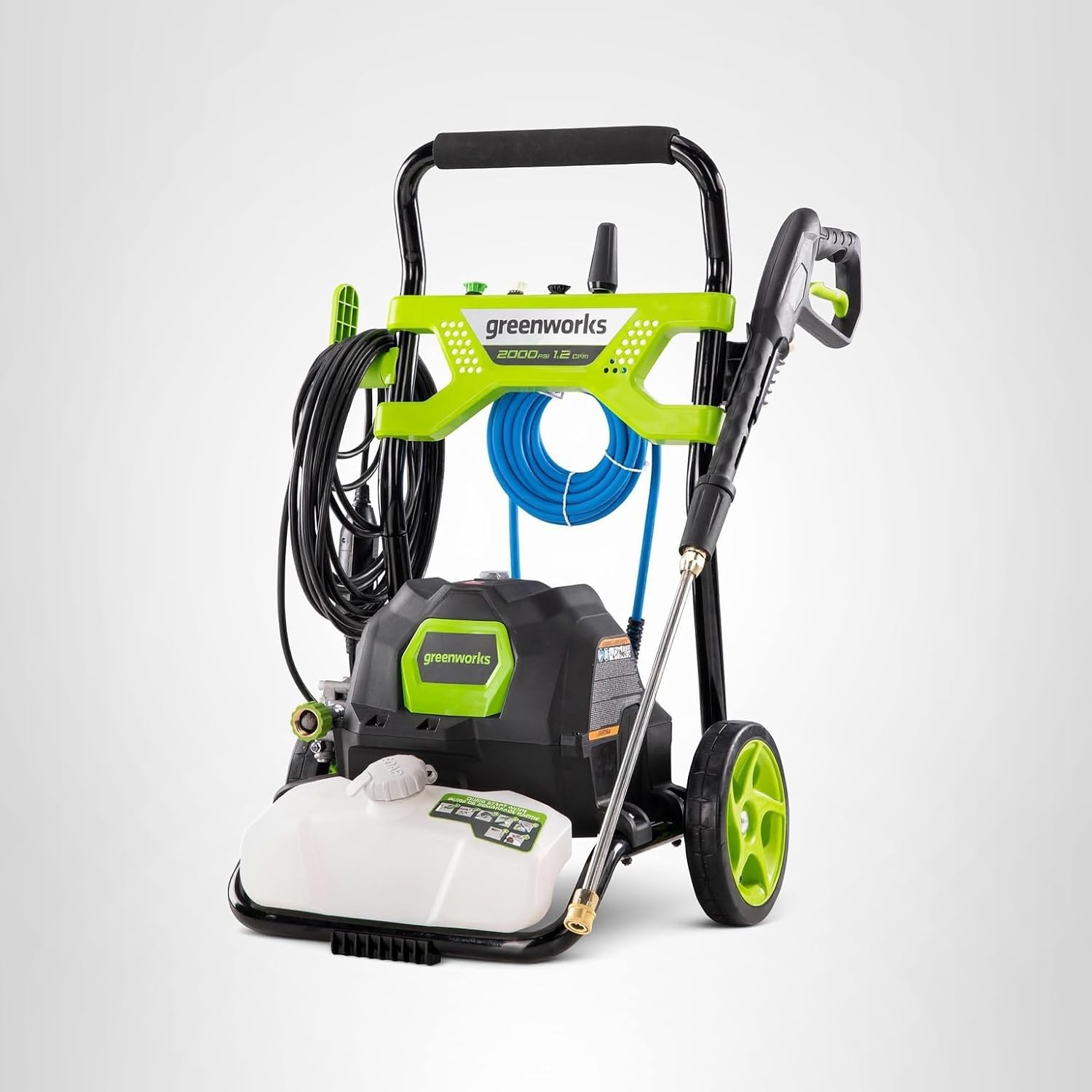THE 7 BEST LAWN WEED KILLERS OF 2026: A COMPLETE GUIDE
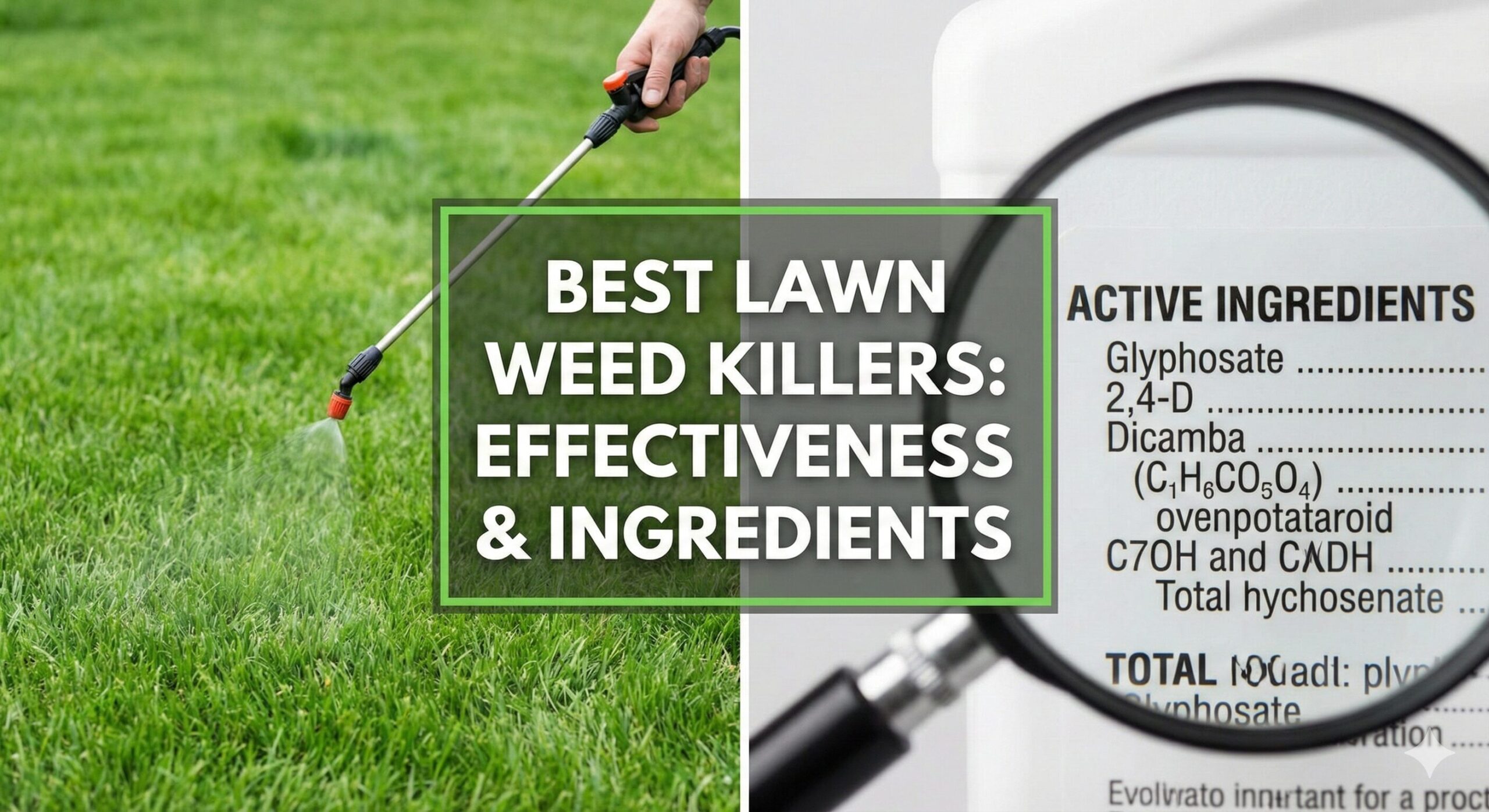
Reclaim your lawn from unwanted invaders with the right 2026 strategy and tools.
There’s nothing more frustrating than looking out at your beautiful green lawn and seeing it marred by a patchwork of dandelions, a creeping invasion of clover, or the ugly, coarse blades of crabgrass. Weeds are more than just an eyesore; they are aggressive competitors, stealing water, sunlight, and vital nutrients from your desirable grass. Left unchecked, they can quickly turn a lush lawn into a chaotic, patchy mess.
Lawn weed killer is one of the most powerful weapons in your lawn care arsenal, but with great power comes great responsibility. Choosing the wrong product can be ineffective at best and disastrous at worst, potentially harming your grass, your garden, and the local environment. Understanding the difference between a weed preventer and a weed killer, a selective and non-selective herbicide, is the key to launching a successful campaign against these unwanted invaders.
This is your comprehensive 2026 battle plan. We will transform you into a weed-fighting expert, guiding you through the science of herbicides, providing detailed reviews of the 7 best lawn weed killers for every situation, and outlining a safe, effective application strategy. A weed-free lawn is an essential part of total property maintenance, a topic we cover broadly in our Lawn Care 101 guide. Let’s get started on reclaiming your turf.
KNOW YOUR ENEMY: A WEED KILLER MASTERCLASS
Before you buy any product, you must understand the core concepts of weed control. Choosing the right strategy is far more important than choosing a specific brand.
THE #1 RULE: SELECTIVE VS. NON-SELECTIVE
This is the most critical distinction in all of weed control.
- Selective Herbicides: These are the heroes of lawn care. They are scientifically formulated to target and kill specific types of plants (like broadleaf weeds such as dandelions and clover) while leaving other types of plants (your turfgrass) unharmed. The vast majority of products marketed as “lawn weed killers” are selective.
- Non-Selective Herbicides: These products, like those containing glyphosate or diquat, are the nuclear option. They kill virtually all plant life they come into contact with, including your grass. They are incredibly useful for killing weeds in driveway cracks, clearing a new garden bed, or eliminating everything to restart a lawn from scratch, but they must be used with extreme caution and should never be sprayed on your lawn itself unless you intend to kill that area.
THE STRATEGY: PRE-EMERGENT VS. POST-EMERGENT
Your timing and strategy determine your choice between these two categories.
- Pre-Emergents (The Shield): These products create a chemical barrier in the top layer of soil that prevents weed seeds from successfully germinating. They don’t kill existing weeds. Pre-emergents are primarily used in early spring to prevent the germination of annual grassy weeds like crabgrass. Timing is absolutely critical for them to be effective.
- Post-Emergents (The Cure): These are the products you use to kill weeds that you can already see growing in your lawn. They are absorbed by the leaves or roots of the existing weed and work their way through the plant to kill it. Most of the products in our review are post-emergents.
THE 7 BEST LAWN WEED KILLERS FOR A FLAWLESS LAWN IN 2026
We’ve analyzed the market to find the most effective and reliable weed killers for the most common lawn care challenges faced by American homeowners this year.
1. ORTHO WEED B GON WEED KILLER FOR LAWNS
Best Overall Broadleaf Weed Killer
WHY IT MADE THE LIST
For the average homeowner battling common weeds like dandelions, clover, and plantains, Ortho Weed B Gon is the undisputed champion of convenience and effectiveness. This ready-to-spray, selective, post-emergent herbicide simply screws onto your garden hose for a perfect, no-mix application. It contains three active ingredients that work together to kill over 250 types of broadleaf weeds without harming most common northern and southern lawn types. It’s rainproof in just one hour and delivers visible results in a matter of hours. It’s the easiest and most reliable way to clear your lawn of ugly broadleaf weeds.
- Type: Selective, Post-Emergent, Liquid (Ready-to-Spray)
- Targets: Dandelions, Clover, Dollarweed, etc. (>250 listed)
- Lawn Safety: Safe for most cool-season and warm-season grasses (check label).
PROS
- Incredibly easy to use—no mixing required
- Kills a very wide range of common weeds
- Won’t harm the lawn when used as directed
- Fast-acting with visible results
CONS
- Not effective against crabgrass or sedges
- Less economical than concentrates
SAFETY FIRST!
Even though it’s easy to use, always wear gloves and eye protection. Avoid spraying on windy days to prevent drift onto desirable plants like flowers or vegetables.
2. SOUTHERN AG AMINE 2,4-D WEED KILLER
Most Economical Concentrate for Tough Weeds
WHY IT MADE THE LIST
For those with large properties or very stubborn weed infestations, a concentrate is the most economical solution. Southern Ag’s 2,4-D Amine is a professional-strength, selective herbicide that is the backbone of many commercial weed control products. You dilute a small amount (typically 2-3 tablespoons per gallon of water) in a pump sprayer and spot-treat weeds with precision. It is exceptionally effective against tough broadleaf weeds like thistle, bindweed, and poison ivy. One quart of this concentrate can make dozens of gallons of spray, offering incredible value for the money.
- Type: Selective, Post-Emergent, Liquid (Concentrate)
- Targets: Thistle, Poison Ivy, Ragweed, and other tough weeds.
- Lawn Safety: Safe for most established grasses.
PROS
- Extremely cost-effective for large areas
- Professional strength for very tough weeds
- Allows for precise spot-treatment application
- A little goes a very long way
CONS
- Requires careful measuring and mixing
- Requires a separate pump sprayer for application
SAFETY FIRST!
Concentrates are potent. Read the label carefully for mixing ratios and safety precautions. Never mix stronger than recommended. Store safely out of reach of children and pets.
3. SCOTTS HALTS CRABGRASS & GRASSY WEED PREVENTER
Best Pre-Emergent for Crabgrass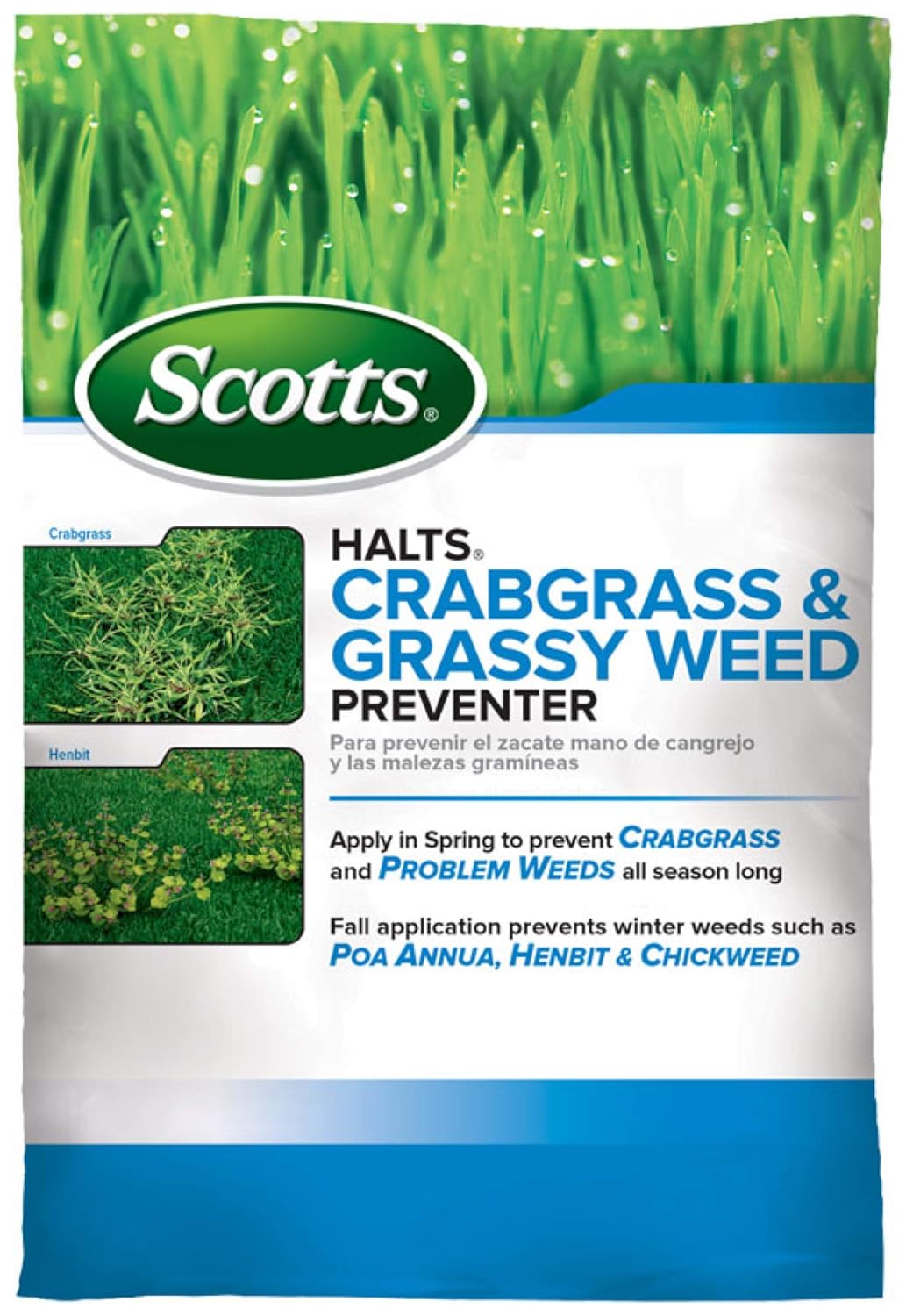
WHY IT MADE THE LIST
Crabgrass is the bane of many homeowners, and the best way to fight it is to never let it start. Scotts Halts is a granular pre-emergent that you apply in early spring before soil temperatures consistently hit 55°F. It forms a protective barrier that stops crabgrass and other listed grassy weed seeds from sprouting for up to 4 months. A single spring application can prevent a summer-long headache. It can also be applied in the fall to prevent winter weeds like poa annua. It’s the ultimate preventative medicine for your lawn.
- Type: Selective, Pre-Emergent, Granular
- Targets: Crabgrass, Foxtail, Poa Annua, etc.
- Lawn Safety: Safe for all established lawn types.
PROS
- Stops crabgrass before it ever appears
- Provides a full season of protection
- Easy to apply with a broadcast spreader
- Effective in both spring and fall
CONS
- Does not kill existing crabgrass
- Cannot be used when seeding a new lawn
SAFETY FIRST!
Pre-emergents also stop grass seed from growing. Do not apply this product if you plan to overseed your lawn within the next 4 months. Read the label for specific seeding restrictions.
4. SPECTRACIDE WEED & GRASS KILLER
Patios, Driveways & Landscape Prep
WHY IT MADE THE LIST
This is your go-to tool for areas where you want absolutely nothing to grow. Spectracide’s fast-acting formula is a non-selective killer, which means it will kill grass, weeds, and any other plant it touches. This makes it perfect for clearing weeds from sidewalk cracks, gravel driveways, paver patios, and along fence lines. It’s also an excellent choice for preparing a new garden bed or clearing a large area to re-seed. With visible results in as little as 3 hours, it’s a powerful and effective way to clear unwanted vegetation from non-lawn areas.
- Type: Non-Selective, Post-Emergent, Liquid
- Active Ingredient: Diquat Dibromide
- Targets: All vegetation it contacts.
- Lawn Safety: Will kill lawn grass. Do not use on the lawn.
PROS
- Extremely fast-acting results
- Kills all types of weeds and grass
- Perfect for hardscapes and landscape prep
- Convenient ready-to-use spray bottle
CONS
- Will kill your lawn if misapplied
- Requires careful spraying to avoid drift
SAFETY FIRST!
The term “Non-Selective” is a serious warning. Even a small amount of overspray from wind can kill patches of your lawn or damage nearby flowers. Use a piece of cardboard as a shield on windy days.
5. ORTHO NUTSEDGE KILLER FOR LAWNS
Best Specialty Killer for Nutsedge
WHY IT MADE THE LIST
If you’ve noticed a bright yellow-green, fast-growing weed in your lawn that seems immune to regular weed killers, you probably have nutsedge. This persistent weed isn’t a broadleaf or a grass, and it requires a specific herbicide to control it. Ortho’s Nutsedge Killer is a selective, ready-to-use formula specifically designed to target and kill both yellow and purple nutsedge without harming your lawn. It works systemically, traveling down to the underground “nutlets” or tubers to prevent regrowth. For this specific and notoriously difficult weed, a specialty product is a must.
- Type: Selective, Post-Emergent, Liquid (Ready-to-Use)
- Active Ingredient: Sulfentrazone
- Targets: Yellow & Purple Nutsedge, Kyllinga.
- Lawn Safety: Safe for most Northern and Southern lawn types.
PROS
- Specifically formulated to kill tough nutsedge
- Kills the plant down to its underground tubers
- Easy-to-use trigger spray for spot treatment
- Won’t harm established lawns
CONS
- Only effective on nutsedge and a few other weeds
- May require a second application after a few weeks
SAFETY FIRST!
Properly identify your weed before use. Nutsedge can be identified by its V-shaped, triangular stem (if you roll it in your fingers, you’ll feel the edges) and its rapid growth rate.
6. BIOADVANCED 3-IN-1 WEED & FEED FOR SOUTHERN LAWNS
Best All-in-One for Southern Grasses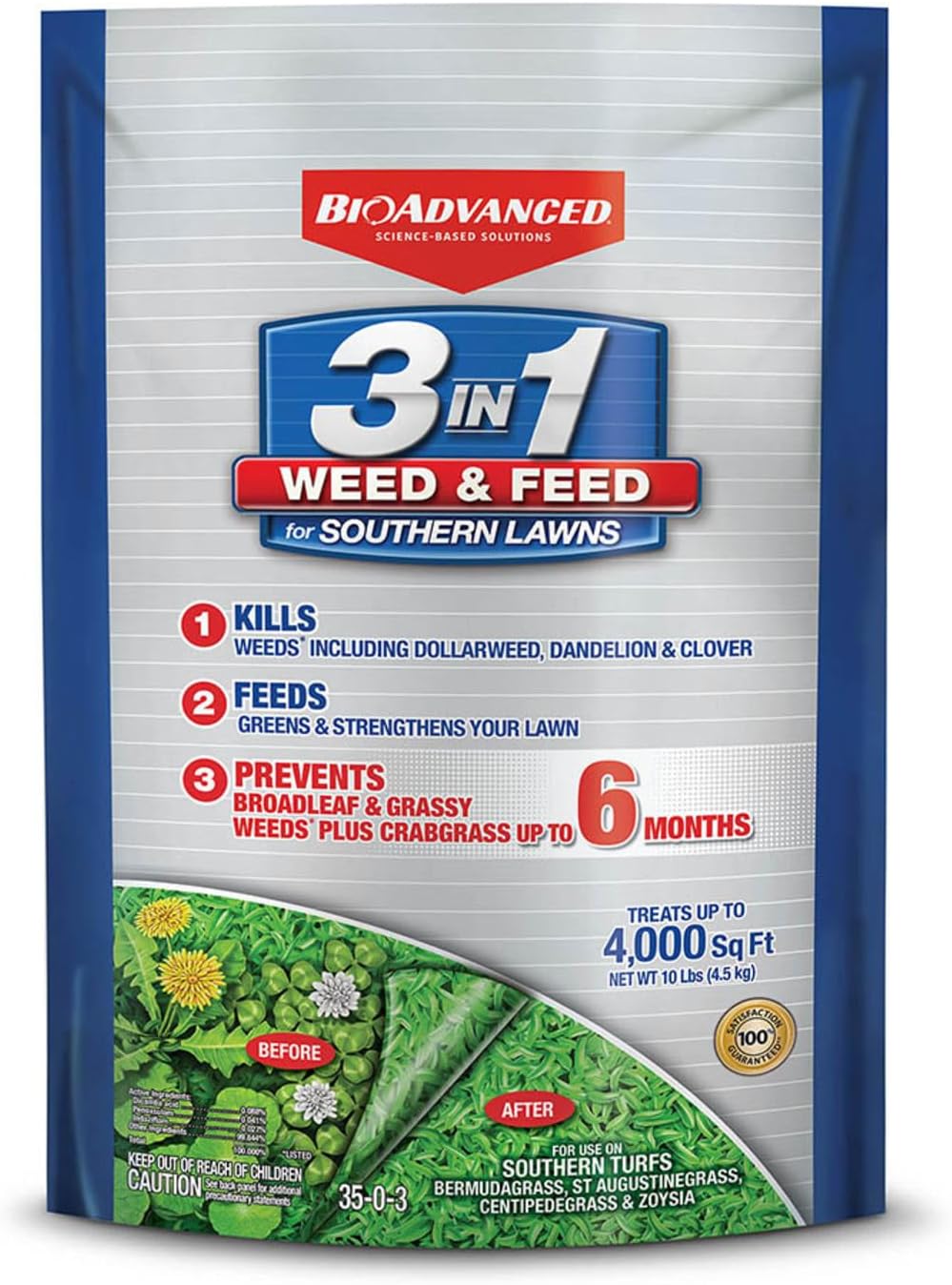
WHY IT MADE THE LIST
Southern lawns with grasses like St. Augustine and Bermuda have unique needs and are sensitive to certain herbicides. This BioAdvanced product is a granular powerhouse specifically formulated for them. It’s a true multi-tool: it fertilizes your lawn for a deep green-up, it kills existing broadleaf weeds like dollarweed and clover, and it provides up to 6 months of prevention for crabgrass. This “Weed & Feed & Prevent” approach saves a tremendous amount of time and is perfect for homeowners who want a simple, one-and-done spring application for their southern turf.
- Type: Selective, Pre- & Post-Emergent, Granular
- Targets: Dollarweed, Clover; Prevents Crabgrass.
- Lawn Safety: For Southern grasses only (St. Augustine, Bermuda, Zoysia, etc.).
PROS
- 3-in-1 action: Feeds, Kills, and Prevents
- Specifically formulated for sensitive southern grasses
- Long-lasting crabgrass prevention
- Reduces multiple lawn care steps to one
CONS
- WILL DAMAGE Northern cool-season grasses
- Requires a broadcast spreader for application
SAFETY FIRST!
You MUST verify your grass type before using this product. Applying this to a Northern lawn like Kentucky Bluegrass or Fescue can cause severe damage or kill it. When in doubt, don’t use it.
7. GREEN GOBBLER VINEGAR WEED & GRASS KILLER
Best Natural/Organic Option
WHY IT MADE THE LIST
For those looking for a synthetic-chemical-free option, Green Gobbler is a popular choice. Its active ingredient is 20% acetic acid (vinegar), derived from corn. It is OMRI listed for organic use and acts as a powerful, non-selective, post-emergent desiccant, meaning it dries out and kills the leaves of any plant it touches. It’s an excellent choice for killing weeds in sidewalk cracks, driveways, and other areas far from your lawn, especially for households wanting to avoid conventional herbicides. It’s important to understand its limitations: it is non-selective and may not kill the roots of tough perennial weeds.
- Type: Non-Selective, Post-Emergent, Organic Liquid
- Active Ingredient: 20% Acetic Acid
- Targets: All vegetation it contacts.
- Lawn Safety: Will kill lawn grass. Do not use on the lawn.
PROS
- Certified for organic use (OMRI Listed)
- Free of glyphosate and synthetic chemicals
- Very fast-acting on plant foliage
- Great for use around organic vegetable gardens
CONS
- Kills grass and any plant it touches
- May not kill the roots of established perennials
- Requires reapplication more often
- Strong vinegar odor
SAFETY FIRST!
Natural does not mean harmless. At 20% concentration, acetic acid is a strong acid that can cause skin and eye irritation. Always wear your gloves and eye protection when handling this product.
THE ART OF APPLICATION: A GUIDE TO SAFE & EFFECTIVE WEED CONTROL
Using these products correctly is just as important as choosing the right one. Safety and proper technique are paramount.
SAFETY GEAR IS NON-NEGOTIABLE
Before you even open the bottle or bag, put on your Personal Protective Equipment (PPE). This includes:
- Long Sleeves and Pants: To protect your skin from splashes.
- Waterproof Gloves: To protect your hands during mixing and application.
- Eye Protection: Safety glasses or goggles to protect your eyes from drift or splashes.
There are no shortcuts when it comes to safety.
THE PERFECT DAY TO APPLY
Check the weather forecast. The ideal day for applying a post-emergent weed killer is a calm, dry, and relatively cool day (between 60-85°F). Avoid windy days to prevent the chemical from drifting onto your prized roses or vegetable garden. Avoid rainy days, as rain can wash the product off the weed leaves before it has a chance to be absorbed.
THE BEST DEFENSE IS A GOOD OFFENSE
The single best way to prevent weeds is to cultivate a lawn that is so thick, healthy, and vigorous that it gives weeds no room to grow. Chemical controls are a tool, but a holistic approach is the permanent solution. A healthy lawn starts with a consistent lawn fertilizing schedule using the best lawn fertilizer for your grass type. Proper, deep watering with the best lawn sprinklers encourages strong roots that outcompete weeds.
THE INTEGRATED WEED MANAGEMENT SYSTEM
A truly weed-free lawn is the result of a complete system working in harmony. This includes cultural and mechanical controls alongside chemical ones.
- Cultural Controls: This means mowing high. Taller grass shades the soil, which prevents weed seeds from getting the sunlight they need to germinate. It also means addressing issues like soil compaction and pH.
- Mechanical Controls: Don’t underestimate the power of hand-pulling, especially when you only have a few weeds popping up. For keeping weed-prone edges sharp and clean, nothing beats the precision of the best lawn edgers and the best lawn trimmers of 2026.
- A Systems Approach: Think of your lawn as an ecosystem. Regular mowing (perhaps with one of the best robotic lawn mowers for constant upkeep), proactive lawn pest control, and fall cleanup using the best lawn blowers all contribute to a healthier turf that is more resistant to weeds. Having the overall best lawn tools of 2026 makes every part of this system more effective.
FREQUENTLY ASKED QUESTIONS (FAQ)
WHAT IS THE DIFFERENCE BETWEEN A WEED KILLER AND A WEED PREVENTER?
A weed killer (post-emergent) kills weeds that are already visibly growing. A weed preventer (pre-emergent) stops weed seeds in the soil from sprouting in the first place. They are used at different times of the year for different strategic purposes.
HOW LONG DOES IT TAKE FOR WEED KILLER TO WORK?
This depends on the product. Some fast-acting formulas can show visible wilting in a matter of hours. Systemic herbicides, which work their way down to the root, can take 1-3 weeks to completely kill the weed. Always check the product label for its expected timeline.
WILL LAWN WEED KILLER HARM MY FLOWERS OR TREES?
Yes, it absolutely can. Most selective lawn herbicides are designed to kill broadleaf plants. Since most flowers, shrubs, and many trees are broadleaf plants, spray drift from the wind can severely damage or kill them. Always apply on a calm day and be extremely careful around garden beds. The roots of trees can also absorb herbicides from the soil, so avoid applying granular products too close to the tree’s drip line.
CONCLUSION: RECLAIM YOUR TURF WITH CONFIDENCE IN 2026
Winning the war against weeds is a marathon, not a sprint. It requires a smart strategy, the right tools for the job, and an unwavering commitment to safety. By understanding the different types of herbicides and matching them to your specific weeds and lawn type, you can move from frustration to empowerment. Use this guide to arm yourself with the knowledge needed to banish unwanted invaders and cultivate the thick, healthy, and flawlessly green lawn you and your family deserve.






